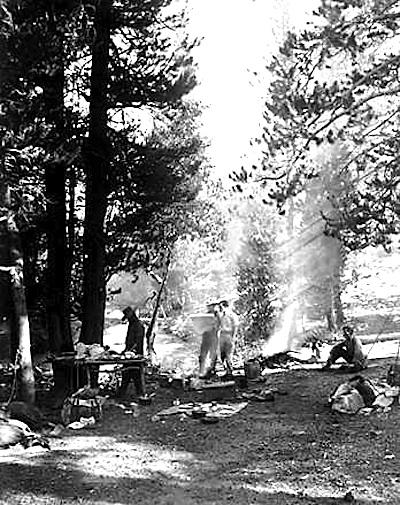
Early campers to Sequoia National Park had very different rules to follow than today's campers./NPS Historic Photograph Collection
With the camping season upon us, be sure you pack accordingly. And if you're heading to Sequoia National Park, that means "for marching purposes, the sleeping bag will give better service on account of its compactness. ... For camping out, a mess kit, frying pan, coffee pot, dutch oven, or baking reflector is (sic) absolutely necessary."
At least that's what the Interior Department recommended in 1912 in its booklet for "Sequoia and General Grant National Parks."
How things have changed over the past century. For instance, while these days we tend to worry about whether streams and lakes carry giardia, a nasty bug that will wreak havoc with your intestinal system, in 1912 Interior officials wrote that in these parks "the waters are pure and fit to drink."
As for any garbage you accumulate during your stay in the park, "all kitchen refuse, cast-off wearing apparel, tin cans, paper boxes, etc, must be deposited in a pit provided for the purpose. When camps are made in unusual places where pits may not be provided, all refuse must be hidden where it will not be offensive, to the end that the site will be suitable for use by future campers."
And if you brought your bicycle to the park, be mindful of the rules that require you, upon "meeting a team, the rider must stop and stand at side of road between the bicycle and the team -- the outer side of the road if on a grade or curb. In passing a team, the rider should learn from the driver if his horses are liable to frighten, in which case the driver should halt and the rider dismount and walk past, keeping between the bicycle and the team."
In 1912 cats were not allowed in Sequoia, but if you brought your dog, and it died in the park, it "must be removed immediately to a point not nearer than one-fourth mile from such camp or thorofare, and there be buried at least 2 feet beneath the ground by the owner or other person having charge of such animal."
Motorcycles and automobiles weren't permitted in the park in 1912, and riding your bicycle or using a horse-drawn carriage or wagon at night was prohibited.
Finally, then, as now, "it is forbidden for anyone to soil or write upon or mutilate any of the signs or structures erected for public convenience," and, "It is forbidden to take bark from from any live sequoia tree on park land."

 Support Essential Coverage of Essential Places
Support Essential Coverage of Essential Places







Add comment